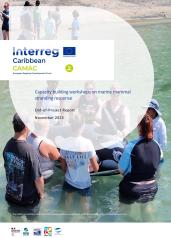Involvement of marine mammal stranding networks
As part of the CAMAC project, a capacity-building initiative was carried out to monitor marine mammal strandings in the Wider Caribbean Region. The main objectives were to improve the skills, organisation, cohesion and equipment of the existing stranding networks, in order to promote the survival of live stranded animals, the management of dead stranded animals and the collection of valuable and rare data.
To achieve this, a toolkit was produced. It was then used in workshops in several Caribbean territories.
The toolkit
The aim of the marine mammal stranding toolkit was to standardise intervention protocols to improve species conservation, as well as to provide the teaching tools and equipment needed to manage a strandings.
The kit is made up of a variety of materials:
- A field guide,
- A beaching declaration form,
- 8 memo and field forms,
- 5 video course and their associated Powerpoints.
The videos present the marine mammal species of the Caribbean and the stranding networks, give keys to species identification, explain the data and samples to be collected and the procedure for a necropsy.
View the videos and download the forms from the documentation below
Please note: this documentation is intended for an informed, identified audience and is not an educational tool for the general public. Consulting the material does not authorise you to intervene in a stranding or to handle a marine mammal, whether alive or dead, stranded or not. Please refer to the regulations in force in your area.
If you witness a stranding and you do not have the legal authorisations, please contact the competent authorities in your area.
Some images in the documentation may offend the senses.

Marine mammal stranding response toolkit
Watch the videos and download the guide and field forms for the toolkit commissioned as part of the CAMAC project.
The workshops
The training kit was immediately deployed in workshops held in 8 territories in October 2023: Aruba, Bonaire, St Kitts and Nevis, the Dominican Republic, Puerto Rico, Haiti, Jamaica and Suriname. These workshops were divided into 6 batches in order to respond to the specificities of the regions and their languages.
The training was aimed at a well-informed audience, with participants from the public sector, governments, NGOs and environmental organisations, universities, the marine industry, veterinarians and biologists.
You can consult the workshop report in the documentation below

CAMAC - report on capacity-building workshops on marine mammal stranding response
Detailed report on training in response to marine mammal strandings as part of the CAMAC project.

Apprendre à mesurer les individus.
Rocio Gonzales - CAMAC
Apprendre à mesurer les individus.
Rocio Gonzales - CAMAC

les participants à la formation reçoivent leur attestation.
Rocio Gonzales - CAMAC
les participants à la formation reçoivent leur attestation.
Rocio Gonzales - CAMAC

Mise en situation pendant la formation échouage à St Kitts.
Kimberly Stewart - CAMAC
Mise en situation pendant la formation échouage à St Kitts.
Kimberly Stewart - CAMAC
